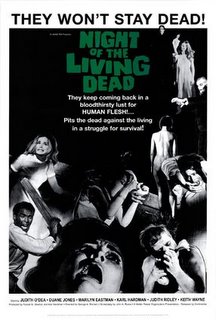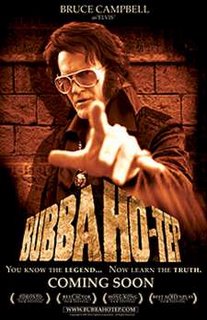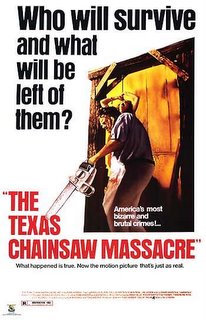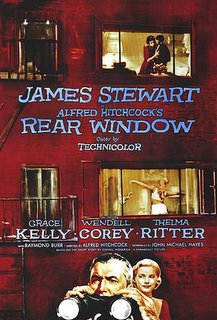Night of the Living Dead (1968)

Minus the acting, which was absolutely terrible, this was one of the best movies we watched this year in class. Going along with the whole scary theme in October, this was a true representation. Even though it was in the good 'ol black and white and was made in what seems like ages ago, Night of the Living Dead was an excellent horror film.
Although to a majority of people, especially to "men," this movie wasn't really scary but there were times when you could see and feel the suspense. What I found interesting was that it started right away too. The movi didn't need a buildup like movies nowadays seem to need. The killinh started right away and as well, the scariness and suspense. I really found myself getting that little wondering factor with a little fear every now and then where I sort of waited to see anxiously what was going to happen next and who was going to die next. As I have said in the past, any movie that keeps me wanting more has something good about it.
This movie was one of those movies that you can learn a lot from film use within the techniques this movie portrayed. The two techniques I favored the most that added a lot of quality to the move was the use of lighting and the common use of the tilt shot. Lighting is a key thing in a movie, especially in scary movies and horror films. I think George Romero did an excellent job of making sure that role in these types of films was fulfilled. As well, in many of the films we've watched this year, I haven't seen much use of what seems to be a tilt shot. As the camera shifts from either the left to the right, it bring what seems like a tilt to the overall frame. I thought that was especially neat because it makes you really focus on each picture.
In a technique sense, and maybe it was just me not catching thing, I didn't really see much use of mise en scene. I looked for it because it is one of my favorite things in film. I like to try to figure the meaning of mise en scene in a film out on my own, then hear other people's take on it, and if available, hear about the real meaning or the director's intended meaning. I think this adds special qualities to a movie and I was a little dissapointed that I didn't find much in Night of the Living Dead. Hopefully, I just majorly missed it.
Of course, with the good of a movie comes the bad, and that was surely evident in the acting put forth in this film. I know we are dealing with old time producing and acting in comparison to the high-tech stuff we are used to today, but there have been certainly better acted movies than this even before 1968. I truly don't see how the director accepted that poor excuse for acting. I don't know if these people were trying to overdo it or what, but in the end it was really "absurd."
At the end of the day, I'd say this was more of a pretty neat film than it was an excellent one. Not to say it wasn't good because it was, but it strikes me more as neat and interesting. With a basic storyline turned into an expressive one and a great ending as well as parts that made me laugh (arguments between the white guy and the black guy), Night of the Living Dead is definitely a classic of its own.
-Kevin



